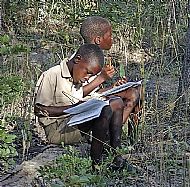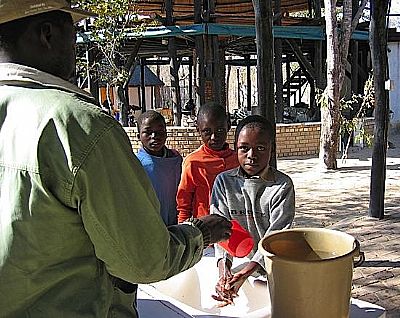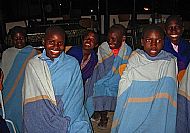PDC Community Education
Funds raised by PDC UK are primarily focussed on supporting PDC’s education initiatives in the local community, particularly with regard to the Bush Camp programme for local schools surrounding Hwange National Park. We believe that only by community education can the future conservation of not only the painted dogs but the whole Hwange ecosystem be assured.
The Bush Camp
It is an unequivocal fact that today's children are tomorrow's wildlife custodians and they need to be educated about the various problems facing endangered species. With this in mind, and to further increase the benefit to the local community, PDC established a Children's Bush Camp in 2004. The objective of the Bush Camp is to teach local children about conservation and give them an understanding of ecological relationships, the value of biodiversity, an appreciation of painted dogs and the role they play in ecosystems, and to inspire an emotional attachment to the beauty and complexity of nature. An extended experiential programme, including teak woodland studies, fireside games and plays and a trip into the National Park, has been specially designed, linked to the National Curriculum for local grade six children. The Bush Camp welcomes approximately 1000 children per year from nineteen local primary schools bordering Hwange National Park for a free four day residential course which has proved, for many, to be a life changing experience.



Evidence Of Success:
- Approximately 6,000 children have visited the Bush Camp since its inception in 2004.
- PDC Education co-ordinators have reported feedback from local communities where bush camp pupils have returned home, gone out into the bush, found snare lines and demanded that villagers go out to arrest the poachers
- Each year group is accompanied by 2-3 teachers who report the ever-growing popularity of the bush camp experience amongst their pupils
- Pupils’ parents are invited to the Bush Camp on the final day of their stay to witness their child’s educational progress and thus spread the conservation message.
- Staff have noted that the general performance of the children has improved in terms of concept grasping, illustrated by the fact that the guides found lesson delivery to be easier and quicker. We believe that this indicates that many of the children have got some information from their elder peers on the lessons dealt with at the Bush Camp before they arrive. This sharing of information is a step in the right direction as PDC aims to increase awareness and knowledge about painted dogs and their role in the ecosystem throughout the surrounding communities.
- A Conservation Club in-school programme has been developed to back up the Bush Camp experience. The programme encourages the children to engage in daily conservation-related activities within their own school grounds and communities. These activities may include cleaning up litter or planting trees. In 2011 a wildlife quiz competition was introduced, linked to a national competition. The children loved the theme of “humans and wildlife: we share a common habitat, lets live together” aimed at widening the knowledge base and increasing perception on wildlife habitation and adaptation while at the same time developing positive attitudes towards nature. The winner of PDC’s local competition, Sir Roy Welensky Primary School went on to the provincial competition in Bulawayo and did the project proud by placing fourth.
Reports from the field on the evidence of success by Wilton Nsimango (Education & Community Development Programs Manager)
We are always looking for signs, even at these early stages, that the programme is changing hearts and minds and we could not have a received a better indication than the reporting of a snared dog, which occurred at Songwa School in July 2011. Nomagugu Mhlanga, who had attended the Bush Camp earlier in the year, came across two dogs on her way to school and noticed one had a snare around its neck and was very weak. She rushed onto the school and reported the matter, urging her teacher to take action. The teacher walked several kilometres to a point where he could make a phone call to the PDC offices. Jealous responded immediately and caught the dog with ease due to its weakened state. Sadly the dog did not recover and died a few hours later. Though a sad ending, we were delighted by the efforts of Nomagugu and awarded her and the school accordingly. Small steps but important ones on the long road we are travelling.
The children have generally developed enthusiasm and a positive attitude to most of the activities involved in the Conservation Clubs, thus developing a young conservation conscious society. The introduction of the quiz competition this year made the perception of nature conservation and painted dogs become part of the children’s lives as observed in the reaction that was taken by the Nabushome children who prevented their parents from killing a python, telling them it was an endangered species. National Parks officers were called in to collect the creature and remove it to a safe location.
To support these activities, PDC UK has to date:
- Provided funds for the upkeep of the infrastructure for the Bush Camp
- Provided computers and other school equipment for the Bush Camp
- Set up pen pal initiatives between Zimbabwe and UK school children
- Provided blankets (courtesy of British Airways) and mattresses for the accommodation facilities at the bush camp
- Helped set up sustainable gardens in the local community which provide fresh vegetables for the bush camp kitchens. Similar gardens have also been developed at several local schools and PDC UK has donated hose pipes and other equipment for water provision.






